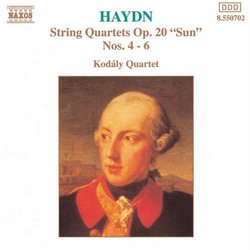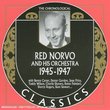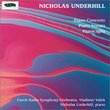| All Artists: Franz Joseph Haydn, Kodaly Quartet Title: Haydn: String Quartets, Op. 20 "Sun", Nos. 4-6 Members Wishing: 0 Total Copies: 0 Label: Naxos Release Date: 2/15/1994 Genre: Classical Styles: Chamber Music, Historical Periods, Classical (c.1770-1830) Number of Discs: 1 SwapaCD Credits: 1 UPC: 730099570220 |
Search - Franz Joseph Haydn, Kodaly Quartet :: Haydn: String Quartets, Op. 20 "Sun", Nos. 4-6
 | Franz Joseph Haydn, Kodaly Quartet Haydn: String Quartets, Op. 20 "Sun", Nos. 4-6 Genre: Classical
Haydn's String Quartet in F minor, Op. 20 No. 5, is the first piece of tragic music composed in the classical period, and it shows that in Haydn's hands this new musical language would be capable of the widest range of exp... more » |
Larger Image |
CD DetailsSynopsis
Amazon.com Haydn's String Quartet in F minor, Op. 20 No. 5, is the first piece of tragic music composed in the classical period, and it shows that in Haydn's hands this new musical language would be capable of the widest range of expression. It's a lesson that Mozart and Beethoven took to heart. But these quartets aren't all gloom and doom--far from it. Op. 20 No. 4, for example, contains a Hungarian Minuet that features one of the composer's many excursions into the territory of folk music, and it ends with a zippy finale that's positively toe-tapping. Unlike many composers, when Haydn broadens the range of musical expression, he always carries his listeners with him. As you can hear for yourself, it's a musical trip worth taking. --David Hurwitz Similar CDs
|
CD ReviewsExploring the Haydn Quartets -- Opus 20 nos 4-6 Robin Friedman | Washington, D.C. United States | 12/06/2006 (5 out of 5 stars) "In his discussion of Haydn's string quartets in the invaluable Oxford Composer Companion's "Haydn", Professor Simon McVeigh of the University of London observes (p. 293): "Haydn's mastery of the quartet genre is one of the most telling and celebrated achievements in the history of Western music. His innate understanding of the grammar and syntax of musical style in the second half of the 18th century was unrivalled and his quartets are a continual exploration of this mastery of language, all the more effective because it is articulated by four players." This recording by the Kodaly Quartet shows that Haydn's quartets amply deserve McVeigh's high praise. This CD, part of a cycle of Haydn's complete string quartets on Naxos, includes the final three quartets of a series of six that Haydn composed in 1772, known as the "Sun" quartets. Haydn had composed at least 22 quartets before the opus 20 set. But in the the opus 20 quartets, Haydn put the form on a new course. He changed it from a rather lightweight divertemento style of chamber music featuring solo instruments to the intimate and expressive style that made the quartet the most weighty and serious form in art music. In their variety of emotional tones, their close part-writing among the voices, their combination of galant and serene writing with learned fugal movements, the opus 20 quartets set a standard for the genre that has rarely been surpassed. Beethoven and Brahms are among the musicians who valued these quartets. As a young man in Vienna, Beethoven copied the scores of these quartets in 1793-1794 to study and learn from them. Brahms, a collector and music scholar as well as composer, at one time owned the autographs of the set. The first work on this CD and the fourth quartet of the set is in D major. It begins in a serene, elevated tone and ends in a movement of jollity and humor. The opening allegro, as does much of Haydn, develops from a single lengthy theme stated at the beginning of the movement. It is a movement both accessible and subtle. The slow movement is in the minor key and consists of a theme followed by three variations, in which the second violin, viola, and cello, respectively have the leads, followed by a return and elaboration of the opening material. The third movement is a "Menuet alla Zingarese" that foreshadows Brahms in its use of gypsy material and strong syncopations. The finale is again based upon a single theme and brings the work to a lively, brilliant close. Of the opus 20 quartets, both the third and the fifth are in the minor key. The fifth quartet in F minor contrasts markedly with the fourth quartet in its sad, plaintive character. With the exception of the trio of the minuet, placed as the second movement, the work remains in the minor key throughout. The work opens with a long, slow, and sad theme given largely to the first violin. The angular minuet, also in the minor, continues the sorrowful feeling of the work. The third movement remains sad, but in a lyrical way, with long high passages for the first violin decorating the rocking theme presented by the three other voices of the quartet. The highlight of this work is the fugal finale, rooted solidly in the minor key with two subjects, which brings the quartet to a learned and passionate close. The final quartet of the series, in A major, shares with its predecessor a learned fugal finale. But in other respects, the work is entirely different. It is in a humorous, happy mood, and first two movements of the quartet emphasize the role of the first violin more than do its companions. Both the opening allegro and the following adagio include concertante, virtuosic passages for the solo violinist. The minuet includes an unusual direction from Haydn requiring the first violin, viola, and cello to play only on the lowest string of their instruments. After these three galant-style movement, the work concludes with a learned three-subject fugue. As always, Haydn wears his learning and skill lightly. The work is a delight. This CD, and the companion volume by the Kodaly Quartet of the first three quartets of opus 20, make an ideal introduction to the Haydn string quartets and to the joy and intimacy of making music. Robin Friedman" Lifetime listening pleasure Ian Muldoon | Coffs Harbour, NSW Australia | 06/11/2001 (5 out of 5 stars) "This version by the Kodaly Quartet is recorded to perfection, well balanced and clear. The musicians allow the music to speak, rather than imposing an idiosyncratic interpretation. Besides, it's a bargain at this price." Excellent Performances A. Ross | USA | 08/31/2007 (5 out of 5 stars) "These Kodaly Quartet recordings of Haydn's string quartets are immensely pleasing and satisfying. The complete set of these quartets is available, and they are well worth the investment. It's a good thing to have the whole set by the same quartet and these recordings are very attractively priced. The performances are excellent: just pure music with any annoyances. It is a pity this music is not more well-known generally. The development of classical music owes so much to Haydn! As a composer Haydn deserves a level of appreciation equal to that of Mozart and Beethoven, and his music occupies a sphere between those contemporaries: clearly within the classical framework like Mozart, yet his work has an added richness and depth that anticipates Beethoven. This is most easy to observe in this highly evolved, and perhaps most intellectually satisfying of musical genres which was literally invented by Haydn: the string quartet. Beethoven once said that he had not learned anything from Haydn while he was his pupil. Yet it is perfectly clear from Haydn's string quartets and other works, that Beethoven absorbed much from Haydn. Beethoven is much closer to Haydn than Mozart. To realize this is essential! (For example compare Haydn Op. 20 No. 1, Mozart K.V. 563, and Beethoven Op. 3.) To deepen one's understanding and appreciation of Beethoven's string trios and quartets, at least a passing familiarity with Haydn's string quartets would seem an important prerequisite. If you have the complete set of Haydn's string quartets, along with the important Divertimenti of Mozart, his string quartets dedicated to Haydn, and the complete string trios and quartets of Beethoven, you can trace the whole history and development of the string quartet from it's origins in Divertimenti straight through to it's ultimate realization in the timeless profundity of late Beethoven. These recordings are an excellent place to start on that exceedingly pleasant path of discovery!"
|

 Track Listings (12) - Disc #1
Track Listings (12) - Disc #1



